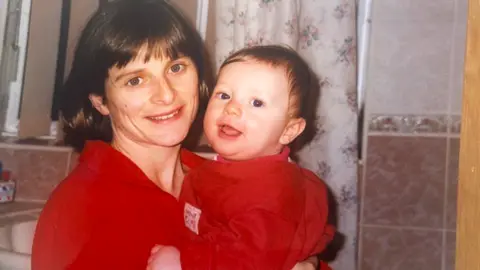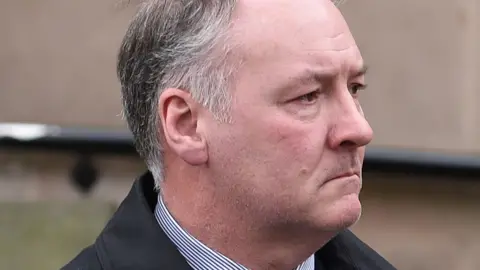No mastectomy is complete - jailed surgeon
 Family handout
Family handoutA jailed surgeon has said he "never intentionally left breast tissue behind" during patients' mastectomies, but that "every mastectomy is incomplete".
Ian Paterson was sentenced to 20 years in 2017, after being convicted of wounding patients with botched and unnecessary operations.
A coroner has since opened 62 inquests into the deaths of some of his former patients, many of whom are believed to have had so-called cleavage-sparing mastectomies from Paterson, where some breast tissue was retained.
At the inquest into Chloe Nikitas, 43, Paterson denied intentionally leaving breast tissue.
He told the hearing: "Every surgeon leaves behind breast tissue - they don't do it intentionally, but it happens."
At his trial in 2017, the court heard that Paterson's technique involved leaving some breast tissue behind, preserving patients' cleavages, which breached national guidelines.
At one inquest in October, Paterson drew a distinction between glandular breast tissue, which produces milk, and the subcutaneous fatty tissue, some of which he said he would retain.
Ms Nikitas, from Tamworth, underwent a mastectomy carried out by Paterson in 2002, but was found to have cancer again in 2005 and died in 2008.
Speaking at her inquest on Thursday, Paterson said that because she was so slim, trying to retain any of her breast tissue was "manifestly stupid", and that leaving any of it behind would have risked the cancer recurring.
He told the inquest that it was aggressive disease, adding: "I think everyone did their job properly."
 PA Media
PA MediaWhen pressed by the counsel to the inquest, Jonathan Jones KC, as to whether or not he had been of the view back in 1995 and onwards, that leaving residual breast tissue behind would lead to the risk of the cancer recurring, Paterson said "it's not a yes or no answer".
He claimed there were a number of factors that predisposed patients to have a local recurrence - meaning cancer comes back in the same place as the original cancer or very close to it.
"What you're asking me to say, I'm not going to say," he told Mr Jones.
When pushed again, Paterson said: "I don't think the breast tissue per se increases the risk of local recurrence, because there are other factors that increase the risk of local recurrence."
However, the jailed surgeon did say that leaving behind macroscopic tissue in Ms Nikitas would be "an obvious risk of local recurrence" and admitted that this would be an error if done intentionally.
Cause of cancer returning
In 2005, Ms Nikitas returned to Paterson and said she could feel a lump under her left arm, with Paterson making the decision not to carry out a further examination such as a biopsy to investigate whether the lump was malignant.
Later that year, a biopsy of her axilla - a region under the shoulder joint where the arm connects to the shoulder - found that Ms Nikitas had Grade 2 ductal cancer.
Paterson said that finding the recurrence of her cancer earlier would have made "very little difference" to her overall survival, because the "disease [was] out of control".
At the inquest, Paterson was also given seven different theories for what caused the cancer that returned in 2005.
Paterson disagreed with six of the theories, believing the most likely was that her original invasive cancer had metastasized beyond her lymph nodes, before her initial mastectomy and immediate breast reconstruction in July 2002.
The theory hypothesised that clusters of cancer cells were not eradicated by radiotherapy and chemotherapy, which led to the cancer spreading from the original tumour and led to her death.
However, Paterson also suggested that Ms Nikitas's original tumour might have had a protein called HER2, despite being classified as HER2-negative at the time.
Paterson said he believed this could be the case, in conjunction with the theory about metastasis beyond the lymph nodes.
He claimed this explained the anomalies in her case, including the "aggressive behaviour of the tumour, the lack of response to treatment, and the non-adherence to predicted survival rates".
The inquest has previously heard that based on the characteristics of Ms Nikitas's tumour in 2002, she had an 88% chance of survival in 15 years.
She lived for only another six years, leaving behind her partner, Klaus Ströhle, and her son.
The inquest continues.
Follow BBC Birmingham on BBC Sounds, Facebook, X and Instagram.
